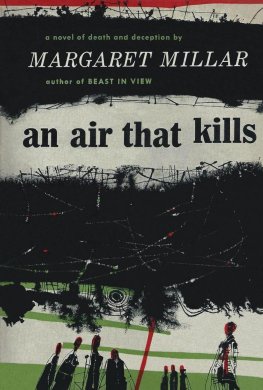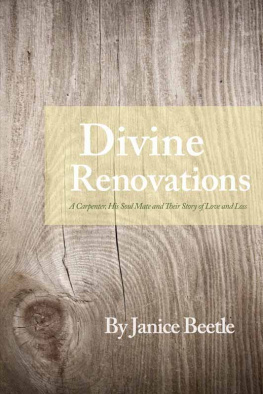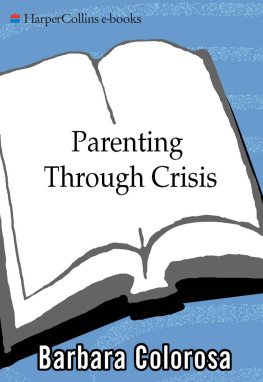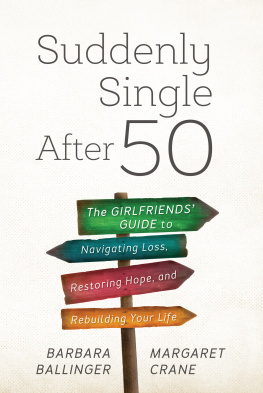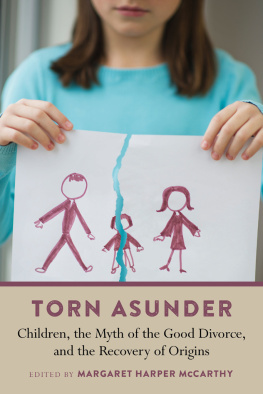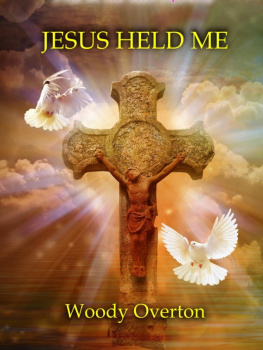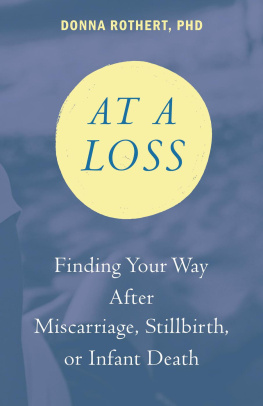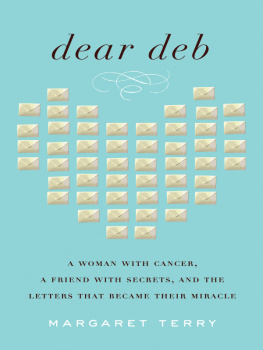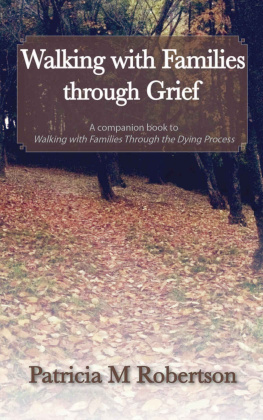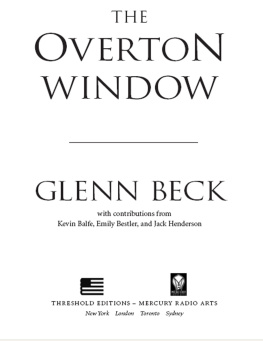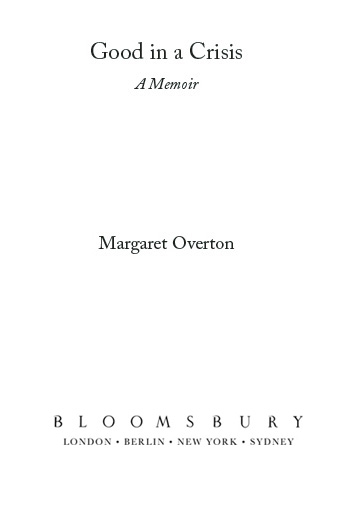
Contents
Copyright 2012 by Margaret Overton
All rights reserved. No part of this book may be reproduced or transmitted in any form or by any means, electronic or mechanical, including photocopying, recording, or by any information storage and retrieval system, without permission in writing from the publisher.
For information address Bloomsbury USA, 175 Fifth Avenue, New York, NY 10010.
Published by Bloomsbury USA, New York
Electronic edition published in February 2012
LIBRARY OF CONGRESS CATALOGING-IN-PUBLICATION DATA
Overton, Margaret.
Good in a crisis : a memoir / Margaret Overton.
p. cm.
ISBN 978-1-6081-9777-4 (ebook)
1. Overton, MargaretHealth. 2. AneurysmsPatientsUnited StatesBiography. 3. AnesthesiologistsIllinoisChicagoBiography. 4. Women anesthesiologistsIllinoisChicagoBiography. 5. Divorced womenIllinoisChicagoBiography. 6. DivorcePsychological aspects. 7. Midlife crisis. 8. Life change events. 9. Self-actualization (Psychology) 10. Chicago (Ill.)Biography. I. Title.
CT275.082A3 2011
616.1'330092dc23
[B]
2011031687
For
Elizabeth
and
Jocelyn
Never waste the opportunities offered by a good crisis.
NICCOL MACHIAVELLI
My story begins with a divorce. The divorce precipitated a series of midlife events that happened to someone whod always presumed she was safe. How I muddled through is part of this tale, certainly not anything Id prescribe to friends or family or even total strangers, merely a description of personal evolution on a very small scale.
The names of the living have been changed. Details, events, and identifying characteristics have been altered out of kindness or to protect the privacy of those involved. Some characters represent composites of two or more individuals. Dialogue has been reconstructed to the best of my recollection.
Margaret Overton
The operating room secretary stopped me as I strode past the control desk wearing Gumby-green scrubs and a long blue paper gown. Hey, Dr. Overton, did you get that page from the CCU?
Yeah, thanks, Mario. I went up there for a code. I walked into the storeroom where I restocked the drugs and equipment Id used at the code blue, then heaved the emergency airway bag up onto its shelf.
It was Memorial Day, and I was on call for the anesthesia department. I had just pronounced someone dead in the Coronary Care Unit. The dead someone was forty-nine, which also happened to be my age.
Call started out well. Id had a large coffee with cream and a double-chunk chocolate muffin, an indulgence I allowed myself only when I knew I had to work twenty-four hours straight. Or after Id worked twenty-four hours straight. But then I got that page. It goes without saying that when a person gets struck down in the prime of life, and by prime I mean the age I happen to be at the time, massive empathy ensues. I felt terrible.
I glanced at the clock. It wasnt even noon yet, and I still had twenty hours of call left.
In a big busy hospital such as ours, people die, all the time, every day. Its depressing. But still, someone my age had just died, on a holiday weekend, and I considered it to be a bad omen for the rest of my call.
I am the type of person who searches constantly for signs, symbols, patterns, coincidences, and metaphors. Outside, indoors, during totally random events, Im usually alert and wondering what it all means. Unfortunately, death isnt a sign or a symbol; it takes you straight beyond metaphor. Death leaves you with nothing but reality.
When I walked through the door of CCU number seven and saw the patientdespite the chaos with all the equipment and noise and the hoopla and mayhem of the nurses and residents and respiratory therapists and medical students and God only knows who else stuffed into that room trying to resuscitate the poor man, drawing up drugs, shocking him, pumping on his chestthe first thing I noticed was that he looked exactly like my dead best friend and former partner in anesthesia, Paul.
I stopped briefly, just inside the door, with the massive airway bag slung over my shoulder, and felt spooked by the resemblance. Paul had been my go-to guy, the person I relied upon to make sense of this morass of a career. He was my thrice-divorced tennis buddy and God-brother. Paul, snark-master. Most important, hed suffered a huge myocardial infarction at the age of forty-nine on Memorial Day eleven years earlier, though he survived it initially. So I felt this weird vibe going on. Memorial Day, heart attacks, forty-ninethe coincidences were swirling.
Tall and bald with a stubby nose and a gap between his front teeth, the patient that morning was nice-looking if you ignored the blue tint to the skin. Death detracts from ones looks, as it should, probably, from an evolutionary perspective. I saw the resemblance to Paul more from the side than from the top down.
I glanced at my scrub shirt. A sticker with the patients name, date of birth, bar code, and medical record number had attached itself to me. Or perhaps I placed it there, second nature.
Jeremiah Sender. I pulled the sticker off and folded it in half. I wondered if he called himself Jere. Jeremiah and Paul might have been brothers; the resemblance was so striking.
I thought back to that day eleven years before. Paul had phoned in the middle of his heart attack to say hed driven himself to the closest ER, which was All Saints Hospital; he asked what I knew about the heart surgeons there. I remember where I was sitting when I got the callon an ivory and white matelass lounge chair in the bedroom, overlooking our backyard. This was back in my Pollyanna days, in those Days Before Divorce. DBD. Before divorce changed everything. Before it changed the way I think. I heard a lot of bad news sitting on that lounge chairmy dads cancer, Mom telling me an elephant was sitting on her chest, a friend checking into rehab. I think I got a few ninth-step phone calls on that lounge chair; I gladly let Stig take it during the divorce. Anyway, a couple of days later, I drove Pauls daughter Linea to see him in the hospital.
Whats a balloon pump, Margaret? she asked me. Paul had had a big heart attack, requiring what is properly known as an intra-aortic balloon pump, a mechanical device that is used in very sick cardiac patients.
Its hard to explain, but basically its a machine that reduces the workload of the heart while supporting the circulation. Kind of like what a friend does in a crisis.
Linea was tall and fair, with a dry sense of humor, just like her dad, and polite, unlike her dad. She babysat for my kids when they were young, and I often came home from a dinner with Stig to find Paul in my family room, feet up on the coffee table, keeping his daughter company while she earned spending money.
Im scared, Linea said, her head turned to gaze out the side window. I dont want him to die.
I know. But hes getting good care, honey. And hes tough, I said. He was so tough that the thought had never occurred to me he might not survive.
Besides, he was too irreverent to die. Paul used to take the newspaper to church. He kept it handy in case the homily bored him. He had no shame. I loved that about him. Somebody like that absolutely could not die.
Still, it shocked me to see him lying in Intensive Care, attached to the balloon pump. Doctors make terrible patients. Paul irritated the nurses, bossed them around. He told them what drugs to give and how quickly to push them through the IV. When I visited, they took me aside to complain about him, as if that would help. I sympathized but said they should see him at work, at his best, where he was really a pain in the ass. Irritable, bossy, but wickedly funny. I used to leave Caramel Creams on his anesthesia machine when he wasnt looking, a misbegotten attempt to sweeten his disposition. He was stoic, though, lying in ICU. Really tough. I did not see any fear in him. And later, after the coronary bypass surgery, when he went home from the hospital, his behavior was restrainedodd for him, I thought, in a way I understand better now. He seemed haunted, as though hed seen something and wasnt sure he liked the looks of it. His expression held distance, distraction. I suspect it was the bullet dodged that put that look on his face. And the understanding that everything you think you know, everything you count on, can change in a heartbeat.
Next page

